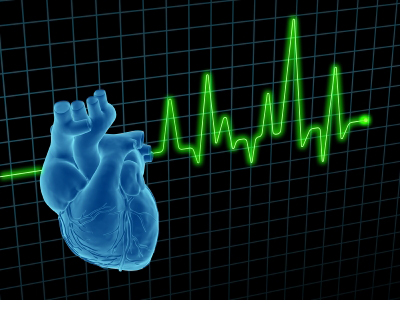Stress and Performance
Why Should Companies Provide Stress Reduction Programs for Their Employees?
People in the workforce often suffer stress-related illnesses such as anxiety disorders, asthma, cardiovascular disorders, chronic fatigue, chronic pain, high blood pressure and irritable bowel syndrome.

In the USA more than half of the 550 million work days lost each year are stress-related (The European Agency for Safety and Health at Work). In the UK, stress accounts for 6 million workdays lost annually (Chartered Institute of Personnel and Development). Statistics Canada has calculated the cost of work time lost to stress at $12 billion a year. This loss is in terms of absenteeism, lost productivity, poor customer service and escalating short and long-term disability claims.
What kind of stress reduction techniques should you provide?
One technique that is easy to learn and to practice is Heart Rate Variability (HRV) Biofeedback.
Heart Rate Variability Biofeedback is a new technique for training people to change the variability and dominant rhythms in their heart activity. The heart is a bio-electrical pump beating at an ever changing rate, and this change or variability is adaptive and is necessary in order to maintain a healthy heart. If you suffer mental or emotional stress, or become depressed, this variability decreases and the heart does not function so well. On the other hand, high HRV is associated with better health and survival from illness.

Recent research has now shown it is possible to increase your own HRV using biofeedback. So, if you are frequently stressed and perhaps suffer from one or more of the stress-related illnesses, you can learn to increase your HRV and be on your way to a healthier mind and body. Initial case reports have shown success with HRV biofeedback in reducing anger and anxiety disorders, asthma, cardiovascular disorders, chronic fatigue, chronic pain, essential hypertension and irritable bowel syndrome (Lehrer et al, 2004; Lehrer et al, 2006; Hassett et al, 2007).
What is Biofeedback?
Biofeedback involves measuring a person’s bodily processes such as heart rate, respiration rate, blood pressure, skin conductance or muscle tension, and conveying that information to them, usually graphically on a computer monitor, in real time so they can become consciously aware of these processes and gradually learn to control them. It is not even necessary to see the actual graphs. Some inexpensive computer software is available (such as Journey to the Wild Divine) that presents you with interactive images that change in the desired way only if you can effectively control your physiological functions.
How can I use Biofeedback to increase my HRV?
All this requires is learning some simple breathing techniques, consciously letting go of worries and pressures and imagining a calm scene in your mind. The biofeedback will continuously give you information on how you are doing.

The Resilience Advantage
is a program, developed by the Institute of HeartMath, based on the physiology of optimal performance that uses practical tools and strategies to strengthen resiliency and improve decision-making. All participants will walk away with concrete practices that increase wellbeing, mental clarity and emotional stability. Dr. Ann Baldwin is certified by the Institute of HeartMath to teach this program. Classes are fun, fast-paced and with “hands-on” learning.
Workshop topics include:
- The latest findings from optimal-performance research.
- The depletion-renewal resiliency model.
- Skills for building resilience in the face of change and uncertainty.
- Intelligent energy self-regulation techniques.
- Benefits of coherence for personal and work effectiveness.
- New research on the how attitudes and emotions affect co-workers and clients.
- How to better access intuition for improved decision-making.
- Practical ideas for easily integrating HeartMath tools into everyday routines.
- Employee satisfaction and wellbeing
- Ability to focus, process information and solve problems
- Regenerative sleep
- Engaged workforce
- Teamwork and morale
- Ability to deal with difficult clients and constituents
- Ability to manage stress, tension, worry, frustration, anxiety, etc.
The Resilience Advantage™ Skills for Personal and Professional Effectiveness
If you would like to arrange a Resilience Advantage Workshop, or a series of workshops, for your group or organization please fill out contact form below and indicate size of group (two-person minimum). The material is presented in modular form and the complete workshop lasts about 7 hours but abbreviated versions of 1, 2 or 3 hours can be arranged. The workshop can be completed on one day or spread over several days or weeks. The cost depends on the duration of the workshop and the number of participants but averages $40 per person per hour. Dr. Baldwin can come to your worksite if it is located in the southwest USA (Arizona, California, Colorado, New Mexico).
Would you like to request a Resilience Advantage Workshop? Please fill out the contact form below, indicating preferred dates and times and number of people in group and Dr. Baldwin will get back to you shortly.
References
Hassett AL, Radvanski DC, Vaschillo B, Sigal LH, et al. A pilot study of the efficacy of heart rate variability (HRV) biofeedback in patients with fibromyalgia. Applied Psychophysiology and Biofeedback, 32(1): 1-10, 2007
Lehrer PM, Vaschillo E, Vaschillo B, Lu SE, et al. Biofeedback treatment for asthma. Chest, 126(2): 352-361, 2004
Lehrer P, Vaschillo E, Lu SE, Eckberg D, et al. Effects of age on heart rate variability, baroreflex gain and asthma. Chest, 129: 278-284, 2006
